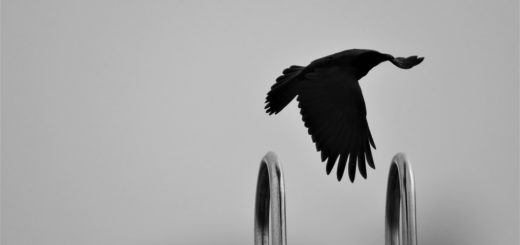Van the Man Redux: It Hurts Him Too
A couple of months ago, I wrote here about two of the most unlikely topics for this website: A contemporary pop musician and a contemporary display of genuine courage. The first topic is unlikely because I have little interest in, and even less respect for, most popular artists of the day; the second is unlikely because genuine courage, of the sort that involves truly taking a risk with one’s own life and reputation, against the entire planet if necessary, is a virtue that one might reasonably have concluded had gone the way of the dodo.
However, in December 2020, Van Morrison, the Irish septuagenarian multi-instrumentalist and musical chameleon, did the unthinkable in an industry — and I emphasize that, an industry — built on performative rebellion and poseur individualism. Specifically, he stood out as a true individual in an industry of knee-jerk collectivist sheep, and a sincere, put-it-all-on-the-line rebel in an industry — a business model — that makes its money selling lefty fakery to children.
Morrison’s quartet of anti-lockdown songs got him smeared by the music press as senile, a has-been, and a sell-out, and isolated from his fellow “stars” (with the grand exception of Eric Clapton), who chose to turn their backs on him as he stood up against authoritarian government and the suppression of art — causes the fake rebels of rock music have pretended to care about for over half a century, only to abandon those causes when they actually alit on the ground of real life, i.e., when being a rebel really meant standing up against the establishment for once, rather than just serving as the establishment’s public mask. (All those anti-war and anti-capitalism songs of the ’60s and ’70s were merely pitching what the progressive vanguard of the day had ordered. Nothing but agitprop and merchandising.)
Recently, Morrison released an enormous collection of new music, what in the day would have been called a “triple album,” almost unheard of, and the sort of event that would have been celebrated as an important moment in pop music had any major artist, including Van Morrison, released it before 2020. In this new collection, cutely titled “Latest Record Project, Volume 1” — all of it available on YouTube via the artist’s own channel — Morrison adopts a traditionalist, almost retro, style, a kind of homage to some of his early musical influences — straight-up blues, rhythm and blues, soul music, and even some pre-rock era doo-wop. He brings out all his instruments, most pleasantly (for this listener) his saxophone and harmonica, to show off his still-considerable ear and sense of musical taste.
All this rousing, at times flat-out cheerful music, however, supported by talented musicians and backup singers, sets the context for some of the sincerely unhappiest lyrics you could ever expect to hear. Much of the content, particularly in the first half of the collection, is related to a very bad and very public divorce Morrison went through a few years ago, which clearly left him embittered in a way that adversely affects the tone of a few of the songs, which feel too personally frustrated to be universally valid as popular art. Others, however, use the personal details to develop themes of contemporary relevance, most successfully on the very perceptive “Psychoanalysts’ Ball” and the bluesy “It Hurts Me Too” (that harmonica!).
Most of the second half of the collection, though occasionally reverting to the broken marriage theme, is focused more heavily on the current world situation, expanding and heightening the ideas introduced in the earlier lockdown songs. For daring to punch right through the establishment wall that normally circumscribes popular music’s fake rebelliousness, and to do so in both negative and positive tones, Morrison has gotten himself even more universally damned by both the popular music press and the mainstream news media. Even members of his own government have singled him out for personal attacks, with Robin Swann, Northern Ireland’s Minister of Health, penning an op-ed for Rolling Stone Magazine (a classic media representative of the perennial phoniness of rock music rebellion) calling Morrison “a dangerous man” for his refusal to bow before the totalitarian lockdown gods.
“He could have chosen to sing about how we all can help save lives. He could have written a tribute to our health and social care workers on the frontline,” Swann deigns to suggest, proposing to replace honest citizen skepticism with kissing the ring of government worker units.
Let us state this clearly: Government officials and the establishment media are circling the wagons to condemn, isolate, and vilify a prominent private citizen they are supposed to be representing — they are making an example of him — for the moral crime of exercising his right to criticize their “policies,” i.e., their unilateral and authoritarian expansion of power.
And now I must offer a personal note: I was not going to write about Morrison’s new album at all, since this is not a popular entertainment website, nor a music criticism site, and since I have already paid my considerable respects to Van Morrison’s courage in the previous article, linked above. However, after observing the level of hatred being hurled against him, and in particular seeing the toll it has taken on him, I have decided to write about it after all. This is the only popular music album of recent years that I can even imagine devoting space to, and probably the last one to which I will grant that honor. But let me show you why I am doing it.
Morrison himself has just released a pair of personal videos in which he responds directly to the treatment he has been given in recent weeks, especially by members of his own government, merely for daring to speak his mind, as though that were still allowed. I present the clips first, and then comment on them.
Here is Video 1:
And here is a YouTube link to Video 2, which Morrison (according to YouTube) has blocked from being embedded on other websites.
My comments:
This is an elderly man who, in the latter stages of a long and distinguished career as a popular entertainer, has put his career legacy, reputation, and personal comfort on the line by saying what no one else in his field of fake rebels has the brains or the guts to say, namely that his country is no longer free, his government no longer a representative of the people, his public officials no longer restrained by any concern for truth or even the need to rationalize their power lust.
This is also a deeply introverted man, a man who makes his living on stage, and yet in concert seems almost unaware that he is in front of an audience, mainly because he obviously wishes he could forget that people are watching him. He feels under assault in his entrenched psychological privacy, and therefore, almost like a wild animal cornered, speaks in these videos in the manner of one deeply uncomfortable, unaware of himself — I love the fact that he seems to have started this public statement midway through eating lunch, and that he repeatedly refers to the attention-seeking, inconsequential government bully Robin Swann as “Robert” — and nearly unconscious of his physical mannerisms, even as he fights back against the crowd of assailants surrounding him. He looks and behaves here like a man so isolated, and feeling so much like he is fighting for his life, that he just doesn’t care anymore — doesn’t care, that is, what they think, how they judge him, what they will say about him. He is speaking out only to explain and defend himself before the general public, perhaps less concerned with winning in the short run — impossible — than with making damned sure everyone knows he is not going to go gentle into that totalitarian good night.
Van Morrison is seventy-six years old. Most of the world is younger and more fit for this fight than he is. They ought to be defending him. Instead they are meekly sitting on their frightened little hands, performing Robin Swann’s recommended “tribute to our health and social care workers on the frontline,” trying not to make the government upset, trying to follow their lockdown rules diligently, trying to make sure no one ever mistakes them for being individuals, for being courageous, for being willing to place their souls above their comfort. No worries. No one will ever so mistake them.
I would say Van Morrison deserves a better twilight to his life. But that would be granting too much power to exactly the inferiors who would like to make Morrison disappear right now. It would be truer to say that we should all face our latter years with as much meaning and nobility as Sir Van Morrison has displayed over the past several months.
Listen to the album’s brusque opening challenge, the sarcastically titled “Where Have All the Rebels Gone?,” with guest performer Clapton closing the festivities with the fiercely unleashed guitar style of his younger days to accentuate the collection’s one uncharacteristic moment of full-on rock edginess to punctuate this pointed message:
Why don’t they come out of the woodwork now?
“One for the money, two for the show” —
It’s not very rock and roll,
Where have all the rebels gone?
Or listen to Morrison’s final saxophone solo in the album’s second-most straight-ahead rock song, “They Own the Media,” which captures emotionally the intellectual content of the song’s unforgivingly nasty lyrical ironies —
They own the media, they control
The stories we are told,
If you ever try to go against them,
You will — be ignored
Or listen to the tongue-in-cheek snark of one of the most playfully “contemporary” tunes, “Why Are You on Facebook?” and enjoy the direct challenge of the accomplished old man calling out the younger generation’s vacuous self-diminution —
Did you miss your fifteen minutes of fame?
Or do you not have any shame?
Or is it some kind of twisted game
To put yourself in the frame
For what some people work very hard to attain?
Or are you looking for a scapegoat to blame
Because you’re a failure again?
Listen to the soulful fellow-feeling of the call-and-response “Thank God For The Blues” —
Singing it for the people
Who feel the same way that I do
Listen to the empathetic laughter of the album’s one direct anti-lockdown song, “Deadbeat Saturday Night” —
I’m alone, telephone,
Virtual reality,
It’s no life, no gigs,
No choice, no voice,
It’s no dice —
Deadbeat Saturday night
And listen to Morrison’s simplest and widest-reaching explication of the realization that awoke him from his apolitical slumbers, in “Western Man” —
Going back to the way it was
Now just seems near impossible,
Western Man has no plan —
They stole it while he was dreaming
These are the songs of a renowned popular artist who has found his voice and his purpose for these times. (And yes, that famously recognizable voice, even at this advanced age and in a lower register, remains the instrument that, as Armond White observes in his review of the album, would sound compelling singing the phone book.) Morrison deserves no pity from us, just respect — and from his critics, “Jealousy,” as he cheekily points out in the album’s iconoclastic final smirk.
Is it because I’m good at my job?
I don’t go with the mob
I don’t do what they want me to do
I made it in spite of you
One of the most interesting lyrical elements of “Latest Record Project, Volume 1” is the way Morrison, known for his bluntly poetic bent, weaves his personal life struggles of recent years together with his more current frustrations about government overreach, in the best cases effectively turning the former into a ready-to-hand metaphor for the latter.
The popular entertainment world loves to give itself awards, which is essentially the way the corporate-progressive establishment of the entertainment industry gives its stamp of approval to those who conform most effectively to the ruling class and/or make the most money. Needless to say, the very character of awards and voting committees precludes any trophies for courage, for refusing to play the game, for not saying what one is supposed to say — let alone for good taste, respect for tradition, or the rejection of the current trendy vanguard. To put it mildly, Van Morrison will not be nominated for any establishment approval this year, which is another way of saying he has done something truly worthy and exceptional in a milieu — a business — ruled by conformity masquerading as originality and party line acquiescence masquerading as “saying something.” Let us just say that this year, Van Morrison, and Van Morrison alone among popular entertainers (with appropriate exceptions for Eric Clapton and anyone else who may wake up in 2021) wins the only award that matters. He wins the Van Morrison Award. He wins his independent manhood in an industry of compliant children, and the freedom of his soul in a business model built on the licentiousness of the body.
My personal favorite song on the album at the moment — alongside the wit of “Psychoanalysts’ Ball,” the overtly Motown-ish musical irony of “Jealousy,” the paean to his Irish roots as the true answer to his youthful odyssey in search of meaning in “Up County Down,” the rousing temper-of-the-times debunking of slavishness in “Diabolic Pressure,” and the album’s most effective blend of the personal and political in the disturbing, emotionally delivered “Duper’s Delight” — is probably “My Time After A While,” an upbeat blues that comes as close to spreading genuine hope as these dark days would seem to permit. And this is appropriate, for after all, the blues — a musical form in which Morrison is well-versed, and of which he is a stellar performer — was originally the music of oppressed people trying to bolster each other’s spirits through the indignity. Morrison, who knows his stuff, exploits and realizes that tone with an urgency and relevance that perhaps no one has brought to the blues since about 1960. On top of that, he spikes this inspirational concoction even further with rollicking piano, a backup chorus playfully echoing his keywords in the vocal group style of 1950 (“Rain, rain, rain, rain, rain”), and not one but two short and punchy saxophone solos from Van the Man himself.


